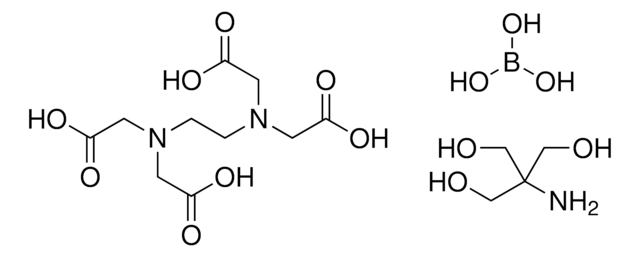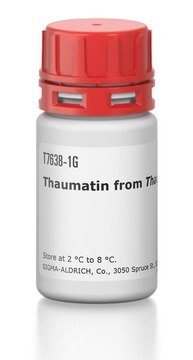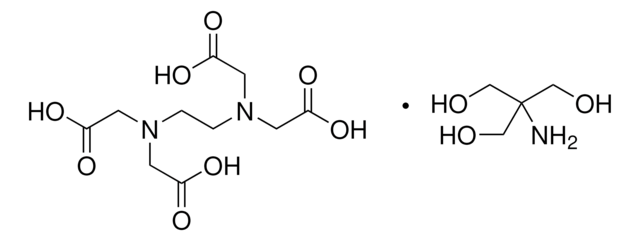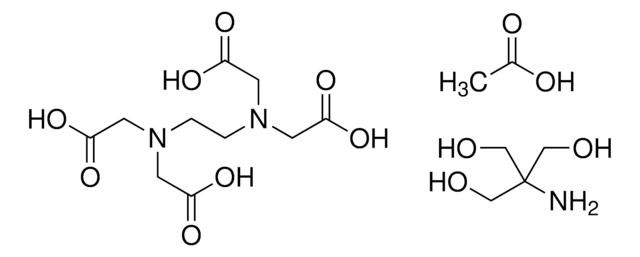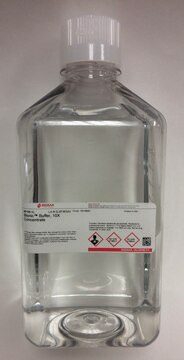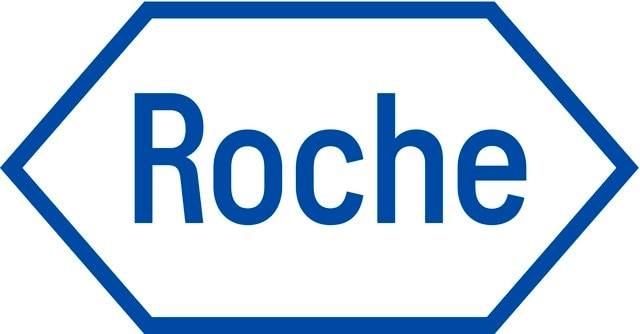T9525
Tris-Borate-EDTA buffer
working solution
Synonym(s):
TBE buffer
About This Item
Recommended Products
sterility
0.2 μm filtered
Quality Level
form
working solution
technique(s)
electrophoresis: suitable
impurities
DNase, RNase, Protease, none detected
suitability
suitable for gel electrophoresis (after dilution to working concentration)
application(s)
diagnostic assay manufacturing
SMILES string
OB(O)O.NC(CO)(CO)CO.OC(=O)CN(CCN(CC(O)=O)CC(O)=O)CC(O)=O
InChI
1S/C10H16N2O8.C4H11NO3.BH3O3/c13-7(14)3-11(4-8(15)16)1-2-12(5-9(17)18)6-10(19)20;5-4(1-6,2-7)3-8;2-1(3)4/h1-6H2,(H,13,14)(H,15,16)(H,17,18)(H,19,20);6-8H,1-3,5H2;2-4H
InChI key
OSBLTNPMIGYQGY-UHFFFAOYSA-N
Looking for similar products? Visit Product Comparison Guide
Related Categories
Application
Dilution of the TBE stock concentrates to a 1× TBE running buffer results in a buffer containing 89 mM Tris-borate and 2 mM EDTA, pH 8.3. The 5× or 10× stocks may also be added to an acrylamide/bis-acrylamide stock solution for making the PAGE gel. Applied voltages of less than 5 V/cm (distance between the electrodes of the unit) are recommended for maximum resolution.
Packaging
Other Notes
Preparation Note
Signal Word
Danger
Hazard Statements
Precautionary Statements
Hazard Classifications
Repr. 1B
Storage Class Code
6.1D - Non-combustible, acute toxic Cat.3 / toxic hazardous materials or hazardous materials causing chronic effects
WGK
nwg
Flash Point(F)
Not applicable
Flash Point(C)
Not applicable
Personal Protective Equipment
Regulatory Listings
Regulatory Listings are mainly provided for chemical products. Only limited information can be provided here for non-chemical products. No entry means none of the components are listed. It is the user’s obligation to ensure the safe and legal use of the product.
EU REACH SVHC Candidate List
EU REACH Annex XVII (Restriction List)
Certificates of Analysis (COA)
Search for Certificates of Analysis (COA) by entering the products Lot/Batch Number. Lot and Batch Numbers can be found on a product’s label following the words ‘Lot’ or ‘Batch’.
Already Own This Product?
Find documentation for the products that you have recently purchased in the Document Library.
Customers Also Viewed
Protocols
The Extract-N-Amp™ Tissue PCR Kit contains all the reagents needed to rapidly extract and amplify genomic DNA from mouse tails and other animal tissues, buccal swabs, hair shafts, and saliva.
Our team of scientists has experience in all areas of research including Life Science, Material Science, Chemical Synthesis, Chromatography, Analytical and many others.
Contact Technical Service